
With markets becoming more globally connected and reliant on technology, governments around the world are rushing to catch up with the pace of financial innovation.
In this global race, the country that successfully crafts a strong and adaptive regulatory framework for digital assets is likely to lead the future of finance.
As global markets become more interconnected and reliant on emerging technologies, lawmakers around the world are working to keep up with a surge in financial innovation.
And in this race, the first country to establish a clear, effective regulatory framework for digital assets wins—and wins big.
That urgency was on full display when Facebook announced plans to launch a new global digital currency headquartered in Switzerland, sparking a flurry of congressional hearings in the United States. These hearings aimed to explore how the U.S. might approach regulation for digital assets and blockchain technologies.
I set aside my usual Netflix lineup to binge-watch C-SPAN, eager to understand how the U.S. plans to maintain its leadership in an economy undergoing rapid transformation—both technologically and legally.
After watching hours of testimony from tech and crypto entrepreneurs, academics, regulators, and financial experts, one major theme stood out:
The future of the U.S. in the digital economy may ultimately hinge on one key question:
Do we need an entirely new regulatory system for digital assets, or can the existing U.S. legal framework adapt to this new financial landscape?

In a July Senate Banking Committee hearing, Jeremy Allaire, CEO of Circle, argued for a new approach. He testified that Congress should “consider new laws that protect consumers while not causing companies to fixate on nearly century-old definitions.”
Allaire emphasized that uncertainty in U.S. regulations is already harming innovation. Blockchain companies are losing ground—especially to crypto firms based in Asia. In fact, he noted that many digital asset projects, including his own, have chosen to domicile outside the United States due to more favorable crypto legislation abroad.
Congressman Patrick McHenry, the ranking member of the House Financial Services Committee, voiced similar concerns during a hearing with SEC Chairman Jay Clayton and all four SEC commissioners. McHenry warned that capital formation is increasingly happening outside U.S. jurisdiction, drawing innovation away from American soil.
Still, McHenry acknowledged some progress. He commended the SEC for approving Blockstack’s $23 million digital token offering under Regulation A+, a landmark decision allowing all investors (including unaccredited) to receive tokens instead of equity. This was the first-ever SEC-approved digital token offering of its kind.
McHenry then challenged the commissioners with a pointed question:
In light of the Blockstack approval, do you believe the U.S. now has a solid foundation for digital asset innovation and capital formation?
Commissioner Hester M. Peirce, known as “Crypto Mom” for her pro-digital asset stance, acknowledged that more work is needed. She highlighted the need for forward-thinking policy, especially around utility tokens, stating:
“I don’t know that the security law frame that we have right now is the appropriate law frame,”
and suggested the creation of a safe harbor to allow innovation to flourish without immediate regulatory interference.
By contrast, SEC Chairman Jay Clayton defended the existing legal structure, saying:

“Over the years, the SEC has developed a regulatory ecosystem that serves investors well.”
But that confidence hinges on how digital assets are classified. The SEC has yet to clarify whether high-profile digital currencies—like Facebook’s Libra Coin (later renamed Diem)—would be categorized as securities under current law.
Adding a global lens, Rebecca M. Nelson, a specialist in international trade and finance, testified that there’s growing international interest in harmonizing cryptocurrency regulations. While the concept of a universal framework is still under discussion, the need for cross-border cooperation is becoming more evident.
Whether or not countries will eventually align on global crypto standards remains uncertain.
What is clear, however, is that world-shaping technology is already here—and evolving fast. It’s now up to lawmakers to ensure it’s leveraged, not lost.
And that begins by answering one fundamental question:
Should the U.S. build an entirely new regulatory regime—or adapt the one we already have to meet the demands of a digital economy?
